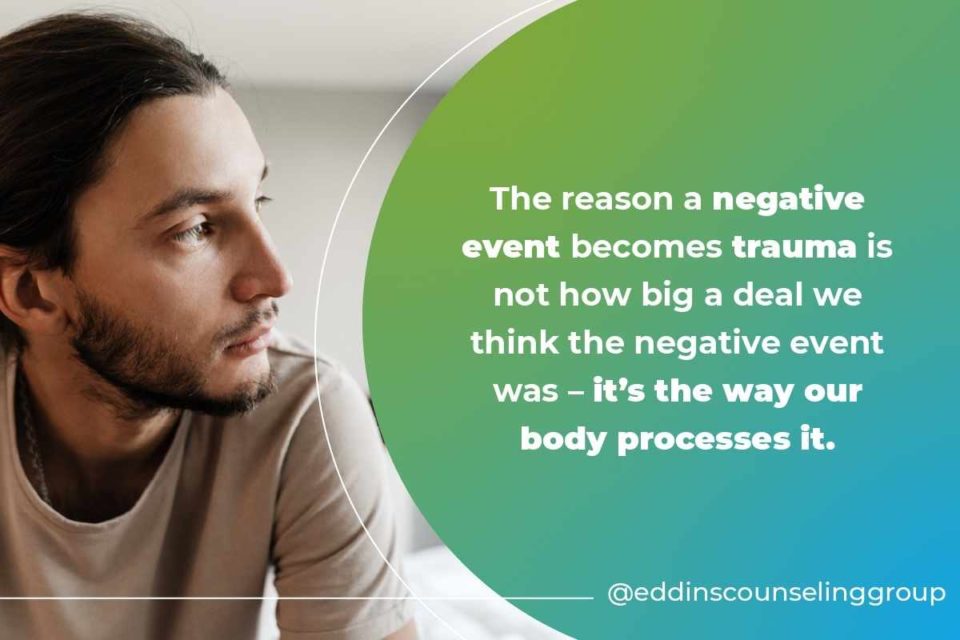August 22, 2022
Anxiety & You: Could It Be PTSD?
Written by Rachel Eddins
Posted in Anxiety, Trauma, Grief & Loss and with tags: Anxiety, PTSD/Trauma, stress management
Anxiety 411
Maybe you’re sitting at your desk. Or maybe you’re walking your daily commute. Maybe you’re chilling with your significant other watching your favorite show on Netflix. Or perhaps you’re just laying in bed trying to convince your thoughts to shut off.
No matter how routine you are, anxiety can sneak up quickly and unexpectedly. Even in the best moments, anxiety can be an annoying companion.
In fact, anxiety is a common experience for many Americans of all ages. “For example, 45% of those under 30 describe being ‘nervous, anxious or on edge’ at least ‘occasionally or a moderate amount of time’ . . .among those 30 and older, 28% do so.”
Common Anxiety Symptoms
Anxiety and stress look different for everyone. Everyone’s experiences with mental health and the symptoms of illness are as unique as a fingerprint.
These general symptoms are common to General Anxiety Disorder (GAD):
- Feeling restless, wound-up, or on-edge
- Being easily fatigued
- Having difficulty concentrating
- Being irritable
- Having headaches, muscle aches, stomachaches, or unexplained pains
- Difficulty controlling feelings of worry
- Having sleep problems, such as difficulty falling or staying asleep
These symptoms may be common but it is not an all exhaustive list. Remember, it’s important to talk about your own feelings of anxiety with your mental health provider.

Types of Anxiety
So is that stress due to deadlines or is it something bigger?
Under the umbrella of “anxiety”, there are a range of common syndromes including:
Anxiety symptoms themselves are not cause for concern. Feeling stressed and anxious from time to time doesn’t necessarily mean that someone is experiencing an anxiety disorder.
So if you’re feeling stressed or anxious, it’s best to talk to someone before assuming the worst. Just like all mental health maladies, the only way to get an effective diagnosis is to sit down with your doctor or psychologist to discuss your symptoms.
Once you identify stress, anxiety, or other unpleasant emotions creeping up in your day-to-day life, it’s important to schedule an appointment to talk to someone who can help.
Trauma & You
When bad things happen, they don’t always go away. Understanding how your body processes these negative events can help you conquer the effects of stress and trauma in your life.
The Biology of Trauma
When negative things happen in life, the body has a very specific response system referred to as the central nervous system. When a negative event happens, commonly referred to as a stimulus, the way our body processes that event can have negative consequences for us in the future.
Our brain may come to understand that these negative events are bound to happen.
In fact, studies show that these negative events can wreak havoc on our emotional health even months and years later.
As such, these negative events have a major impact on our mental wellness and our ability to cope with stress. We call the stress and negative mental health consequences caused by the negative events – trauma.
Trauma can be caused by a wide range of negative events. Whether that event might be big or small, it can leave a lasting impact on someone’s mental health.
It’s important to remember that whether you feel that a negative event was a big deal or not, it doesn’t influence whether that becomes a traumatic event. Even if you did not lose a loved one or think that the experience was “really bad”, it can still become a traumatic event.
The reason a negative event becomes trauma is not how big a deal we think the negative event was – it’s the way our body processes it.
Trauma vs. Anxiety
Now that we know how trauma is formed, we can differentiate it from emotions like anxiety and stress.
While anxiety can come and go, trauma is a longer lasting dragon to slay. It may help to think of anxiety as an analogy: if anxiety is the iceberg, trauma is the ice hidden below what we can see.
There is much more to the negative emotions we experience than just what’s on the surface.
Trauma itself is not anxiety – it’s more of a biological response to anxiety. When your body senses similar stimuli called triggers, it may cause your heart to beat faster and your mind to focus on the stressor.
This is because your body remembers the traumatic event and wants to prevent you from being in danger. A traumatized brain kicks the body into turbo mode by triggering the central nervous system’s fight or flight response. This tells the body that there is danger and you need to be prepared to react.
How to Treat Traumatic Anxiety
Just as Smeagole held onto the ring of Mordor for dear life, so too our bodies can hold onto trauma if it’s not unlearned. Fortunately, there are some positive steps you can take to manage stress and reduce anxiety.
Be Kind to Yourself
Dealing with stress and anxiety can be very taxing on our emotional and physical wellbeing. It’s important to show yourself kindness and grace as you walk through your journey of recovery.
Sometimes this can be as simple as forgiving yourself for the emotions you experience – letting yourself feel them without trying to control them. Remember that the things out of your control are not for you to change.
Allow the process to be just that: a process. One that takes time and energy and patience. Show yourself the same compassion you would show to a friend going through a difficult time.
There is Hope
Everyone’s process of unlearning or undoing trauma will depend on the nature of the trauma. The great news is that trauma does not have to be a permanent part of our lives.
Innovative therapies in the field of trauma recovery are being implemented around the globe, enabling people to resolve trauma & anxiety. Even if your traumatic events happened months, years, or a lifetime ago, it’s never too late to start recovery.
Some of the therapies we offer for releasing trauma include:
- EMDR Therapy (EMDR)
- Brainspotting Trauma Therapy
- Somatic Therapy
- Trauma-Focused Cognitive Behavioral Therapy (TF-CBT)
By identifying and understanding your body’s triggers, you can be better equipped to face the world without the threat of anxiety swallowing you whole. It may take time, but it’s a great time to start that process.
When to See a Therapist
As the old saying goes, “The best way out is through.” When it’s hard to manage your stress and anxiety, facing it head on with a supportive professional can make all the difference.
If your stress is adding up and you feel overwhelmed, you may be wondering when enough is enough. The key is to be proactive.
Don’t wait until your stress level is through the roof.
Instead, when the stress of life affects your overall day-to-day mood, invest in your mental health by scheduling an appointment with your Houston, Montrose, or Sugar Land counselor.
Receive a personalized trauma treatment plan and the peace of mind that comes from releasing your stress and anxiety in a safe space. To start your journey of mental wellness today, call or click today to speak with a trained anxiety and PTSD expert.
5 Ways to Reduce Anxiety
Get instant access to your free ebook.
Grounding & Self Soothing
Get instant access to your free ebook.
Create Healthier Thoughts & Feelings
Get instant access to your free ebook.
Why You Feel This Way
Get instant access to your free ebook.






















